9 Aug 2024
How to Develop Construction Management Software: A Complete Guide
Matthew Connor

In the current construction industry, effective project management is vital to project success. Since construction projects become more complicated and complex, companies require robust tools for managing them that work with their unique processes and needs. Although off-the-shelf solutions are readily accessible, more businesses recognize the benefits of developing their tools for managing projects with non-coding development.
This blog will discuss the most essential elements of a successful construction management software. We will explain the benefits of developing their system with no code, exploring advantages such as personalization, project cost savings, speedy development, flexibility, and scalability, while also delving into the ability to empower users:
- Not technical and seamless integration capabilities.
- Incremental improvement.
- Improved user experience can be obtained by creating individual software for managing projects.
Understanding the elements of a system for managing projects and taking advantage of the advantages of development without code, anyone from builders at home to supervisors of contractors can develop a personalized, cost-effective, and effective solution that is tailored specifically to construction projects. It’s time to get in the grip of your project management and reap the advantages of building your system using no code. Let’s get started and look at the possibilities!
What is Construction Management Software?
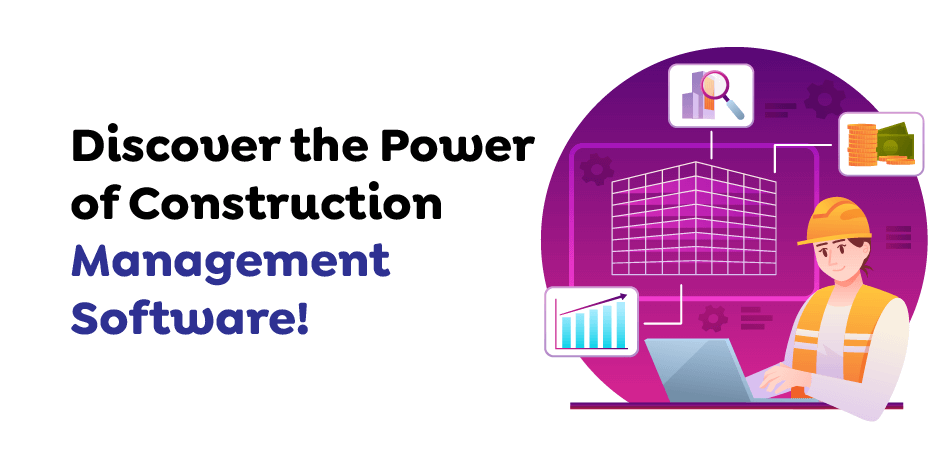
Construction Management Software allows companies in the construction industry to control their projects from beginning to completion. It automatizes processes, monitors progress, and improves communications between team members and other stakeholders. In essence, it’s software designed to boost efficiency in the construction industry.
Benefits of Construction Software Development
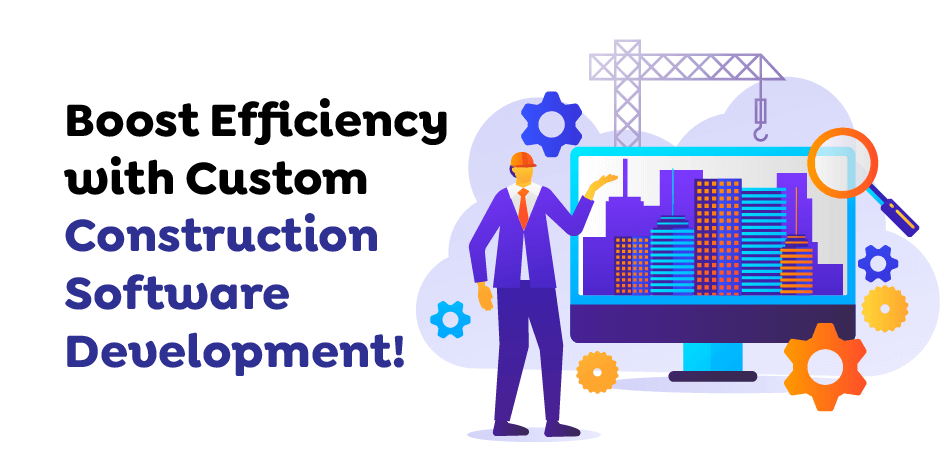
Construction Management Software Development is the process of creating innovative software programs that aid construction professionals in managing, organizing, and supervising building projects.
Some organizations within the construction industry wonder why every construction company needs to use a construction management system. How do they determine whether it’s worthwhile or a waste of time?
To be able to answer these questions, we must look at the way that software used in construction helps with growing businesses and the advantages of using it. We will discuss the reasons to consider investing in a construction management system:
Increase Operational Efficiency
Did you know that FMI discovered that contractors spend 35 percent of their time in unproductive activities, like looking up project information, dealing with rework, and resolving conflict? Cloud-based construction software can streamline the project’s lifecycle and improve operational efficiency, allowing contractors to stay ahead in the digital age. Cloud-based software also eases process development, enabling you to work effectively and precisely and put energy into profitable activities.
High Quality, Less Risk
This program allows project managers to organize, schedule, and manage various tasks easily. This ensures smooth operation and minimizes delays. Additionally, the software monitors the project’s performance, permitting early detection and minimizing risk.
In the case of decreasing risk factors, the software will keep your data simple and standard. It offers an automated and consistent report, which makes it simpler to manage data using mobile devices with strong security. Furthermore, it saves your information on a cloud and centralized system, ensuring all users have secure and authorized access to your project’s sensitive and up-to-date information.
Improved Decision-Making
With the top software designed for construction, You can access actual-time information and insight to make better choices. From scheduling and planning projects through cost management and allocation of resources, it gives you all the data you require to analyze, closely compare, and make smarter choices to improve the outcomes of your projects. In addition, you can improve your forecasting and scenario planning by studying previous data to identify potential risks and opportunities before making any crucial decision.
Seamless Business Expansion
When your company expands, managing multiple projects at once becomes a challenge. Construction software provides an array of sophisticated features that help you manage the complexity of scaling.
It enables automating repetitive tasks and frees up your valuable resources for new projects. It also facilitates seamless collaboration and sharing of information access across projects and teams to ensure everyone stays on the same page and up-to-date throughout the process of expanding. However, it also optimizes the allocation of resources and their utilization and allows companies to tackle larger projects with less effort.
Cost Control
Cost efficiency for construction projects is a problem by itself. However, using precise budgeting and cost-tracking features in construction software could be the ability to manage expenses. You can get exact budgeting, allocation, and real-time cost monitoring through these tools. This allows contractors to quickly spot any potential cost overruns before they occur and take preventive steps to prevent them from happening.
Key Features to Look for in Construction Management Software
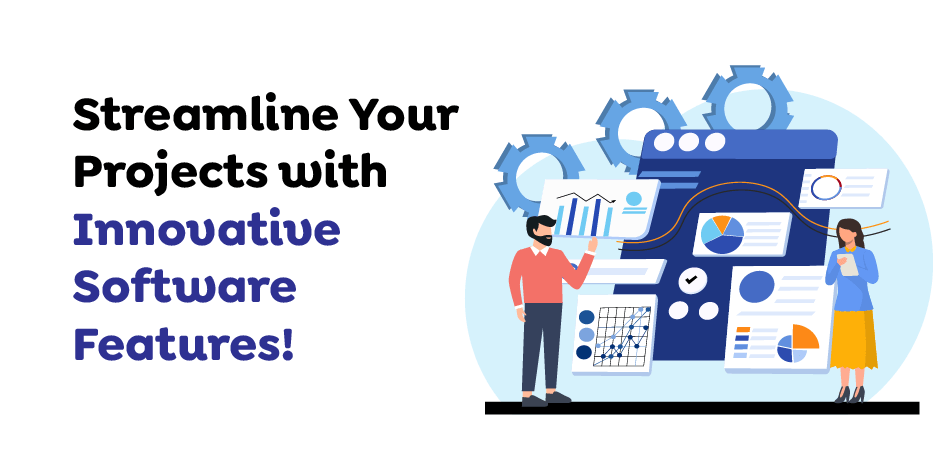
Every construction company has different project requirements, including residential construction software, institutional, commercial, and so on. This is why contractors are seeking customized software now: to ensure that they can tackle projects of any size, type, and complexity.
Even if you have an effective custom construction software solution must contain the following features:
The project planning and construction software permits you to establish groups of workers, work together on a clear roadmap for your project, set realistic budgets, and establish deadlines in one place. Project completion can be effortless with all your team members working together and working towards the same goals.
Smart Scheduling:
The success of construction projects is based on careful planning. The software comes with Critical Path Method (CPM) scheduling features that allow users to allocate tasks, set milestones, monitor progress quickly, and keep their projects on track.
Budgeting:
With the construction Management software, you can simplify the budgeting process by effortlessly uploading estimates, linking costs to a Work Breakdown Structure (WBS), and making invoices in just a few minutes.
Document Control:
Imagine having all the essential documents of your project—such as specifications, plans, contracts, and plans—all in a single secure storage location. This software makes it easy to upload, share, upload, and control versions, making sure that everyone on the team has access to the most current and most sensitive data.
Resource Management Software:
Resource management software for Construction Management Solutions provides a comprehensive overview, allowing resource managers to view equipment availability, materials inventory, and team members’ skill sets in a central location. It helps optimize resource allocation and ensures that everything is present whenever it is needed, increasing efficiency while also decreasing the time to repair.
Also Read – The Ultimate Guide to Legal Case Management Software: Streamline Your Success
Collaboration and Communication:
This program allows for seamless collaboration by providing an integrated platform for sharing the latest information and tasks, assigning them to others, and ensuring that communication channels are clear. It also reduces the possibility of miscommunication, informs everyone, and ensures your work can move forward without a hitch.
Project Tracking:
This feature equips construction managers to track their projects in real-time using capabilities. It assists them in monitoring progress from conception to completion, identifying roadblocks in the early stages, and making changes according to need.
Benefits of Construction Management Software
Construction and building industries differ from other sectors, and a standard collaboration system could be a better solution. Utilizing a reputable project management system has a high possibility of making progress and achieving the best results and sometimes gaining the following advantages:
Real-time Communication and Collaboration
Every project, regardless of its area, is a matter of overcoming communication obstacles and discussions that eventually enhance the coordination and planning for field activities. The software for project management in construction permits external parties to communicate with construction companies and also provides workers with the means of clarifying internal concerns about the project being developed.
- Team dashboard
- Calendars shared
- Prioritization of tasks
Budget Management and Accounting
A budgeting tool is essential to manage construction projects’ budgets and forecasts effectively. Today, project managers can depend on the many capabilities the construction software offers. It is easier to estimate costs in project control. The cost performance records of earlier projects or standards can be found here, along with the construction techniques involved as well as the materials required (the work, expertise, equipment, and knowledge.)
Additionally, the software for managing projects can assist in establishing the price of the bid for the project, the core accounting system, and expense control, for example.
- Budget dashboard
- Time tracking
- Invoicing
Resources Management
Another way to gain knowledge about the use of Construction PM software is through the management of the resources involved. Although it is closely linked to the control of costs in addition to revenue estimates, management of resources is, by itself, a worthy area that requires particular focus. Equipment, inventory, and expertise are essential resources needed for the job. In this stage, you can determine whether the usage of resources is consistent with the original estimates and whether there is an opportunity to optimize them. The use of the resource is recorded, analyzed, and categorized. The data is saved and used for the improvement of future projects.
Document Sharing and Control
Sharing documents among team members and external participants is simpler through the construction PM software. Whether it’s an internally operated tool or an integrated system, the software provides access to various information sources like wireframes, blueprint specifications, and digital plans. The software for construction project management typically offers an entire document management system that ensures that the documents are correct and that fewer spreadsheets with errors are required. Furthermore, when a central documentation control program is installed, the decision-making process can be simplified, too.
- Reporting
- Storage of data
- Templates for standard documents
Business Expansion
Finding construction management software with the correct features is vital for any business looking to grow and gain an increased market share. PM software can help facilitate efficient operations, make projects more quickly, and eventually boost the return on investment. You’ll be able to design and manage more projects simultaneously, ensuring that your expenses are in check, reducing time, and decreasing manual labor by utilizing automation of business processes.
Process of Building a Construction Management Software
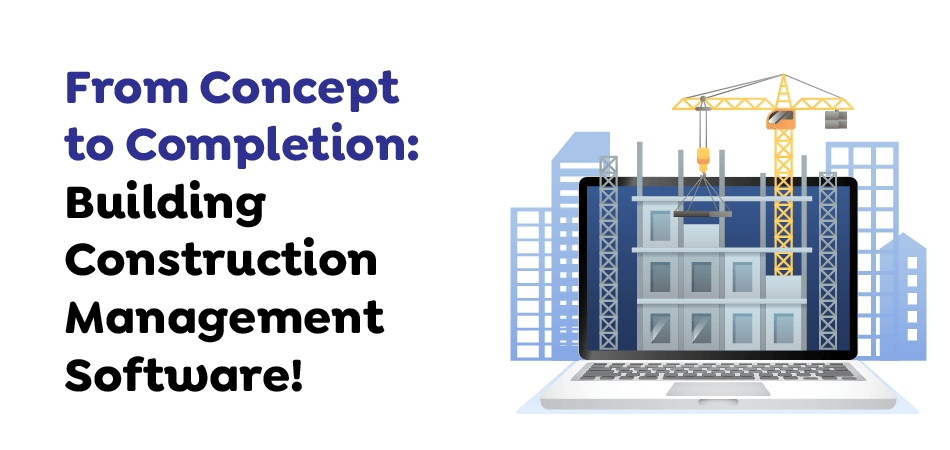
Developing software for construction is a complicated, multi-step undertaking that requires meticulous planning and execution. Each Procore like Software Development process step uniquely impacts the final product’s success. Let’s examine the phases in more detail:
Market Research and Needs Analysis
Understanding users’ and the market’s needs is essential for identifying the project’s scope and tailoring the development of construction management software. This step involves studying the market to find potential gaps and opportunities in the construction industry and obtaining user feedback to highlight specific characteristics.
These knowledge-based insights are crucial since they ensure that the product meets industry real-world requirements. Additionally, research into market needs and analysis not only drive the direction of development but also help guide design choices throughout the development process.
Choosing the Right Tech Stack
The right technology stack is crucial in software development. It affects performance, scalability, and future maintenance. Choosing between hybrid, native, or web-based platforms can impact accessibility and user experience. Additionally, factors such as the team’s expertise, project timeliness, and security requirements determine this decision.
The technology stack chosen directly affects the development of construction management software costs due to the varying resources and licensing costs. Selecting the latest technologies may provide competitive advantages, but it could necessitate a more significant expenditure. With careful consideration, the software is durable, efficient, and able to meet the market’s requirements. The balance between these aspects is crucial to successful software development.
Designing User Experience
Ensuring you design the user interaction (UX) is crucial to ensuring the software is user-friendly and user-friendly. A carefully thought-out UX design can increase user enjoyment and satisfaction. This involves the creation of prototypes and wireframes that show the user experience. The feedback from users who are interested in this stage is precious. It helps refine the software to make the software more compatible with the needs of users. The user’s accessibility and ease of use are the top priorities.
The software’s design ensures that it can accommodate different skills, which is crucial in creating a program such as Procore. An effective UX design significantly impacts the adoption rate and overall performance. This method provides the basis for a development process centered on the user.
Development and Integration of Technologies
The development phase is essential because it transforms design ideas into functioning software, requiring competent developers’ time and expertise. This stage is focused on coding the vital functions and user interface. Incorporating advanced technologies such as AI and AR/VR dramatically increases the software’s capabilities. Additionally, the collaboration between front-end developers and back-end engineers is vital to ensure seamless integration.
Also Read – How an AI App Development Company Drives Innovation in Mobile Applications?
Adopting agile software development allows for agility and efficiency. At this point, the cost of building a construction management system such as Procore is greatly influenced. However, it is among the fundamental steps in software development that help bring the project’s vision to fruition.
Testing, Deployment, and Continuous Improvement
This is developed with rigorous testing to test the program’s capabilities. Testing ensures the software’s reliability, security, and user-friendliness prior to its launch on the market.
After a successful test phase, the software can be placed in the right environment and is accessible to users. In addition, ongoing improvements are essential to keep your competitiveness. User feedback is driving the need for updates and enhancements. This iteration method is crucial to adapting to changing market demands and ensuring relevance.
It is crucial to realize that a commitment to continuous maintenance and support following the deployment can lead to the development of software that is simple to use and helps streamline operations. This is essential when creating a program such as Procore since it ensures the software is relevant and valuable for users.
Additionally, it provides the development of a full-featured solution that can meet industry requirements and users’ expectations, demonstrating its quality and effectiveness.
Cost to Build Construction Management Software
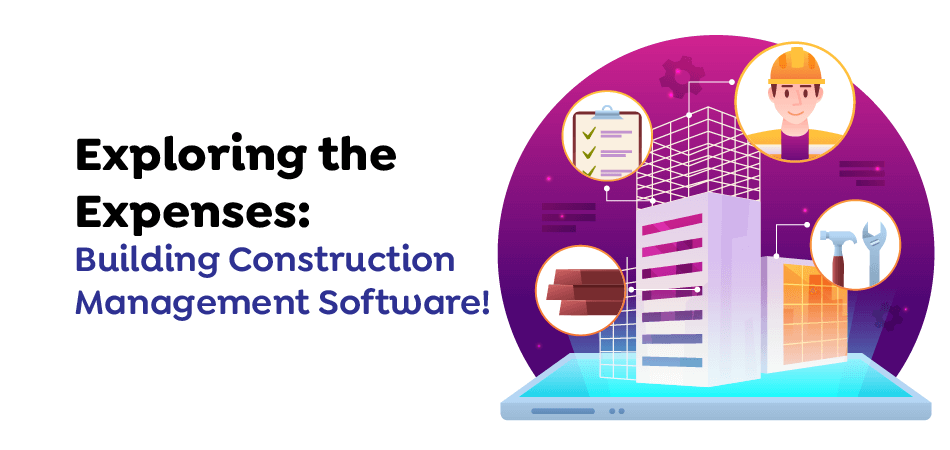
The price associated with software creation for construction companies will vary based on various aspects, including the features you require, the size of your business, the expertise of your development team, and the choice of deployment (cloud-based or on premises).
The exact cost will depend on your particular requirements. Here’s an estimate to help you understand the price range of software for construction management development:
- Basic Construction Management Software document sharing and reports Between $50,000 and $150,000.
- The mid-range construction management software, which costs between $150,000 and $300,000, includes resource management and budgeting, cost tracking, and basic integrations with third-party companies.
- Professional-level Construction Management Software: Advanced tools for planning projects, analytic Dashboard, customized integrations, and mobile applications- approx. $4,00,000
Some vendors offer customized pricing plans for potential customers, considering the latest features, support, and specialized training they require for their company.
Factors Affecting the Cost of Building a Construction Management Software Like Procore
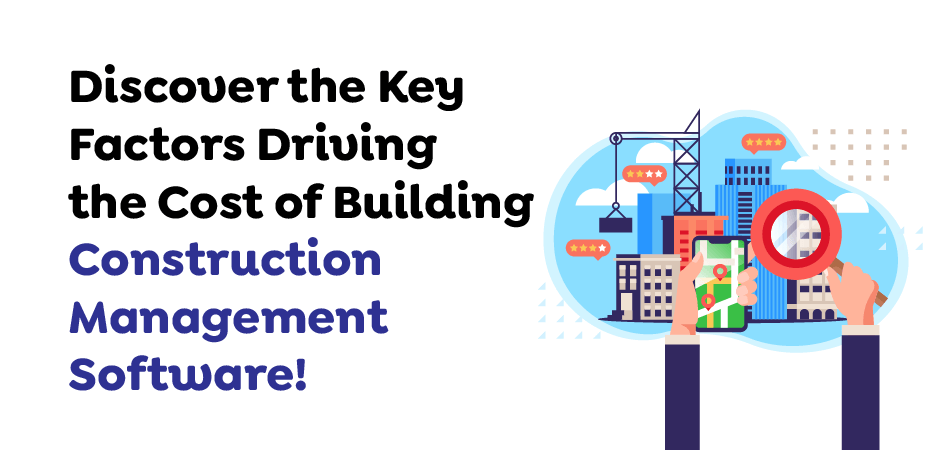
Calculating the cost of developing construction management software demands understanding the various elements. This includes the complexity of these features, the selection of the technology stack, and the level of experience of the team responsible for development. Here are the main elements to be considered.
Complexity and Scope of the Software
The functionalities and features planned will play an important role in the project’s development. Simple software that focuses on the basics of management requires less investment. As construction management software’s development costs increase with complexity, including advanced analytics or real-time collaboration tools can significantly increase the cost.
Specific modifications to the construction process or compliance with regulations affect the expense. Implementing cutting-edge technologies such as AI analysis or the Internet of Things to aid in on-site equipment tracking also affects cost. In the end, the scope established at the beginning of the project lays the foundation for cost and resource allocation during the development stage.
Choice of Technology Stack
The choice of a suitable technology stack is crucial to successful software development. It affects capabilities, scalability, and, ultimately, user satisfaction. The cost of developing a construction management software like Procore will vary depending on whether you choose native web, hybrid, or native platforms. Although native software is more secure and efficient, the cost of development can be higher due to the platform’s specificity.
Web technologies provide a wider range of access at lower cost. However, they may sacrifice advanced features. Hybrid solutions can balance costs and features by catering to a wider market without requiring a significant investment in separate codebases.
Furthermore, choosing between cloud-based solutions or on-premise ones can particularly impact the scalability and flexibility of operations. Cloud-based solutions usually offer more flexibility and scalability, effortlessly adapting to a project’s changing needs at a minimal cost. However, on-premise options provide greater control over data storage. However, they are more involved in infrastructure management.
The technology chosen will affect maintenance and upfront costs, affecting the budget overall.
Data Management and Security
The best way to manage data is to manage, store, and protect the massive amount of data generated by construction projects. This is essential for successful project execution and compliance with regulatory standards. Robust security protocols protect sensitive data from access by hackers and potential breaches, which adds to the difficulty and expense of software design and development.
Integration With Existing Systems
In order for the software to manage construction to be effective, it should be able to integrate easily with the existing system, such as ERP accounting, financial, and resource management tools. This usually requires customized development to ensure complete compatibility and performance, which ultimately increases the scope and costs of your construction project.
Scalability Requirements
The ability to scale is crucial as construction management software must handle a variety of data volumes and accommodate business growth over time. Investing in an open design and scalable technology will allow your software to expand its capabilities without compromising security or performance and can impact both the development cost and long-term maintenance.
Scalability allows your software to integrate seamlessly with new technology and market and industry trends, ensuring you are ahead of the curve. This proactive approach to software design improves the power to adapt to changing requirements and provides an investment that will last a long time by cutting down on the need for costly updates.
Design and User Experience
An intuitive and well-crafted design and a smooth user interface are crucial to making users feel comfortable and engaged. These elements determine the way users interact with the software and affect satisfaction and the rate of adoption. The investment in top-quality UX/UI design ensures that the software is user-friendly and addresses the diverse needs of construction professionals. The development of software for construction management costs can increase depending on the degree of design expertise and customized elements needed for the user interface.
Improved UX features like customized dashboards and easy navigation can make a difference in an increasingly competitive market. Despite increasing the initial cost, these investments can contribute to long-term success by improving user retention and reducing training requirements.
Location of the Development Team
The position of your development team greatly affects the total cost of creating software such as Procore since the hourly cost of development can vary across different locations around the world. One sure-fire method to reduce costs is outsourcing software development to countries such as Asia, particularly India because the country has access to competent professionals knowledgeable in the most recent technology.
This region’s attention to technological advancements means that software developers have the tools to develop innovative, high-quality software that is technically compatible with the required regulations. In addition, outsourcing to these areas provides access to innovative methods and significant advantages in the global market.
Maintenance and Support
After launch, maintenance and support are crucial to the long-term viability and reliability of the software. Regular updates, bug fixes, and security updates are vital to ensure that the software is in the game. The price of building an application for construction management, such as Procore, includes these ongoing costs but can differ according to the service agreement. Customer support by email, messaging, or phone can add to the price.
Based on the factors above, the price to create a program like Procore could range from $35,000 to $200,000. Adjusting to the latest technologies or changes in regulations requires constant investment. Allocating funds for these elements will ensure that the software is safe, functional, and up to the user’s expectations.
Conclusion
In the end, construction management software is crucial in increasing efficiency, accuracy, and coordination in construction projects.
Making a customized software solution built by a mobile app development company in Canada that meets your project’s requirements requires careful planning, selecting the best development platform, designing a user-friendly interface, precise coding, rigorous testing, and successful deployment. Although the process of creating your application may be daunting, the outcomes are efficient project management, and simplified processes are enough to warrant the time and effort.
Get in touch with Techugo to develop your custom construction management software.
Get In touch
We are excited to here from you and let’s start something special Together. Call Us for any inquiry.
Write us
sales@techugo.caJust a call away
About you




